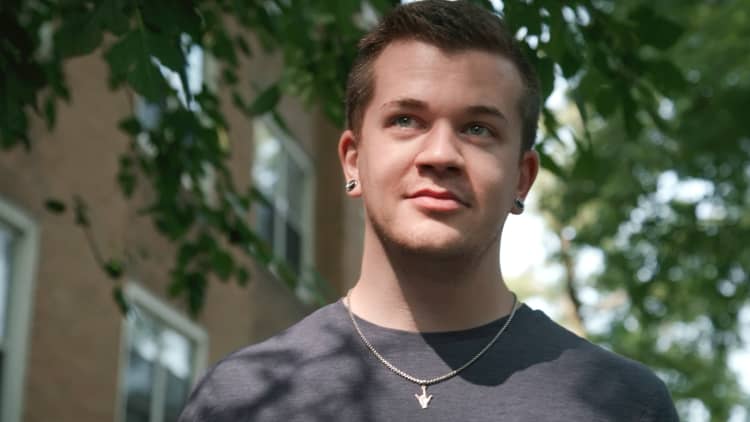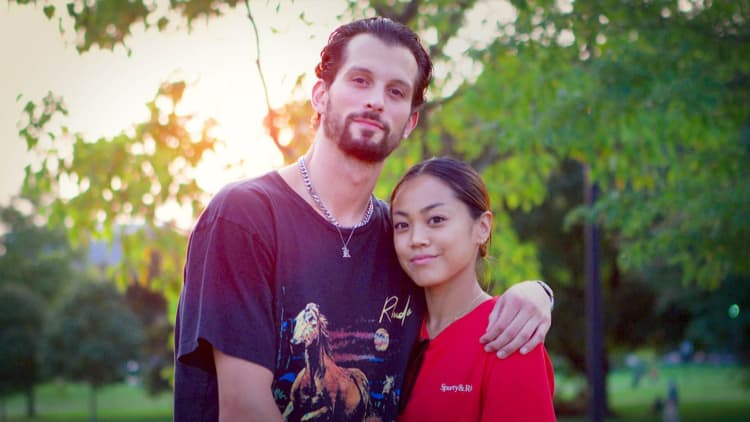This story is part of CNBC Make It's Millennial Money series, which profiles people around the world and details how they earn, spend and save their money.
Dylan Gutierrez, 30, and Jeraldine Mendoza, 29, are preparing for early retirement. Unlike most millennials, they don't have decades of career advancement ahead of them — at least not as professional ballet dancers. Most dancers retire by 35 or 40, and with that in mind, the couple is diligently saving a big chunk of their $178,000 combined annual income in anticipation of their next act.
They've spent their whole lives in the ballet world — Gutierrez grew up learning from his mother, a professional ballet dancer and instructor, and Mendoza started taking her first lessons when she was 5 — and they know that the physically demanding profession has its limits. With just a few years left as dancers, they're already beginning to make plans for new careers in the arts.
Gutierrez joined the Joffrey Ballet in Chicago in 2009 and met Mendoza when she joined two years later. Their connection as partners in the dance studio was instantaneous, Gutierrez says: "We crossed paths immediately. And, you know, the rest is history."
In the years since they started dating, the couple bought an apartment together, adopted a Boston Terrier named Kahlua and got engaged in the summer of 2019.
Their finances are atypical in a number of ways: They usually earn a steady paycheck 10 months out of the year during the company's season. The rest of the time they focus on earning money through side work and also qualify for unemployment benefits, which combined made up 20% of their 2019 income. And because of their younger retirement age, the couple has spent the last few years getting serious about their savings, setting up streams of passive income and preparing for their future careers and lives together.
Here's a look at how Gutierrez and Mendoza manage their time and money as professional ballet dancers in Chicago.
Making a living in the arts
As lead dancers with the Joffrey Ballet, Gutierrez earns about $77,000 per year, while Mendoza earns about $66,000 per year.
Both make additional money by teaching dance classes and performing in other companies' productions. Dancing in "The Nutcracker" productions around the country during the holidays can be especially lucrative. Last year, Gutierrez earned an additional $15,000 through work outside his Joffrey contract, while Mendoza brought in an extra $20,000.
Gutierrez is eager to dispel the myth of the starving artist and show how you can earn a good salary in the arts. "If you're a ballet dancer, you're not doing it for the money," he says. "You're doing it because you love it and it's something you're passionate about. But it is a profession that a lot of people make a very, very good living in."
The pandemic has been disruptive
Like workers in countless other industries, the couple has been impacted by the Covid-19 pandemic. When the coronavirus tightened its grip on the U.S. in March, the Joffrey Ballet ended its season early. The company guaranteed dancers' pay through the remainder of their normal 40-week season, which ended in May. "We both were very fortunate," Gutierrez says.
Typically, during the summer months when Gutierrez and Mendoza aren't working for the Joffrey, they file for unemployment benefits and make up for lost income through extra projects in the dance community. This year, they were able to file for benefits again and were eligible for the additional $600 weekly stimulus pay provided under the CARES Act.
With the additional benefit, their paychecks were just about equal to what they'd normally earn from the Joffrey, and they used these funds to cover their normal living costs, medical bills for Kahlua and a little more online shopping than usual.
The dancers resumed training in September and are guaranteed a salary for a shortened 36-week season for 2020-2021. In October, however, the Joffrey Ballet canceled in-person performances until further notice. The company has tentative plans to have dancers rehearse and perform two ballets this fall that will be available for digital streaming.
Canceled in-person performances will likely mean there's no busy holiday season this year, so Gutierrez and Mendoza are thinking of other income streams they can use to boost their earnings. Over the summer, the couple taught dance classes via Zoom for extra income and brought in a total of $600, though this was much lower than their typical off-season earnings.
The couple also used some of their spare time during the pandemic to give back to social justice causes. Mendoza helped organize a fundraiser that raised $4,000 for the Black Star Project, which aims to close the racial wealth gap in the south and west sides of Chicago. The two also helped teach a class that raised $1,600 for the Black Lives Matter foundation.
Building a savings habit
Gutierrez and Mendoza are engaged but keep separate bank accounts for now. They split shared costs down the middle or trade off on expenses.
Mendoza says she learned a lot of her money savvy from her parents, who work in engineering and insurance and invested in real estate after moving from the Philippines to San Francisco in the 1980s. She describes her family as middle class and well-off. While she doesn't budget every dollar, Mendoza says she's known within her circle of friends as being good with money and likes to help them find ways to save for their futures, too.
Gutierrez, on the other hand, grew up with a much more lax approach to money. His dad is a musician and his mom is a ballet dancer and teacher, which afforded him a great introduction to the arts but less so to finances. "Money and money management wasn't really a focal point in the house growing up," he says.
While Gutierrez knew in theory that it was a good idea to save, it wasn't until he met Mendoza that he made it a priority to manage his earnings, spending and savings more meaningfully. He started by saving $300 from every weekly paycheck, building up a $1,000 cushion in his checking account, and began paying more than the minimum on his credit card every month.
In turn, Mendoza says Gutierrez has helped her learn how to negotiate for fair wages, especially when she sets rates for her side projects doing guest performances and other work.
The dancers prefer to save in their own accounts — roughly $500 from each weekly paycheck — for their future, rather than relying on a traditional retirement account they will not have access to for several decades after they retire from full-time dancing. Today, Gutierrez has roughly $13,000 and Mendoza has roughly $35,000 in savings. And because they are union members with the American Guild of Musical Artists, about $80 to $100 of each of their weekly paychecks is deducted and funneled into a pension fund.
"One of the reasons why Jeraldine's savings account is quite a bit higher than mine is because I did spend a lot of my money on her ring," Gutierrez says. "I thought it was very important because I wanted her to have something really beautiful on her finger for the rest of our lives."
How they budget their money
Here's a look at how Gutierrez and Mendoza spent their money in August 2020.
- Food: $2,885 (groceries, eating out and takeout)
- Housing: $1,953 (mortgage on a 2-bedroom, 1.5-bathroom apartment)
- Pet: $1,056 (medical bills)
- Utilities: $446 (Wi-Fi, electricity and homeowners association fees, which cover heat, gas and water)
- Hobbies: $220 (the couple recently bought skateboards to try a new outdoor activity)
- Phone bill: $165 (Gutierrez and Mendoza are on separate family plans)
- Transportation: $130 (Ubers)
- Subscriptions: $105 (Apple Music, Netflix, HBO Max, YouTube TV)
Gutierrez and Mendoza bought their apartment near Wrigley Field in 2017. The place was originally listed at $349,000, but they ended up negotiating the price down by $9,000 by offering the previous owner free tickets to the ballet for a season. They split the $15,000 down payment and a $1,953 monthly mortgage.
"This is our biggest investment together," Gutierrez says. "We want to try and build on it in the future, but just having it and trying to pay off as much of it as possible is really important to us."
Gutierrez and Mendoza say they like to spend their money on nice things like well-made clothing, designer accessories and especially food. While they often enjoy splurging on nice meals out at restaurants, they also see it as a way to build their relationships around Chicago.
The two usually funnel part of their weekly pay from the Joffrey into savings, but because they were not earning steady paychecks in August, they did not put funds aside. The dancers pay about $100 once per year in union membership dues. Their health insurance is covered by the Joffrey Ballet, and they pay roughly $10 per week from each paycheck during the season for dental coverage.
Another recent change to their monthly budget is spending on Kahlua, who was recently diagnosed with lymphoma for a second time. Gutierrez and Mendoza, who don't have pet insurance, expect to spend up to $10,000 on her chemotherapy treatments. "She's essentially our family, so we make sure she's taken care of as well," Gutierrez says.
Looking ahead
For now, the couple's plans for a destination wedding in Italy are on hold due to the pandemic, but they're in no rush to host a formal ceremony before health risks of the virus subside. "We're essentially married already," Mendoza says.
In terms of their future careers, Gutierrez, who earns a few hundred dollars a year on the side making and selling trap and hip-hop music, hopes to start a production company.
Mendoza hopes to pursue interior design — a skillset she taught herself and flexed during the $30,000 renovation of their condo. "It gives me the same joy as I would [feel] when I'm dancing on stage or rehearsing," she says.
The two hope to eventually move back closer to home and buy a house in California, while keeping their Chicago apartment as an investment property. They strive to be financially stable today so they can make sure they can pursue their interests in the arts community for decades to come.
"I think it's important for people to know that you can make a living in the arts, and that it's not just the people you've heard of that are doing well," Gutierrez says. "We don't make a ton of money, but we do well enough to really enjoy our lives and also get to do something we love. And so not only do we feel wealth of the pocket, but we feel a wealth of the mind, body and spirit through through what we get to do."
What's your budget breakdown? Share your story with us for a chance to be featured in a future installment.
Check out: Chase Sapphire Preferred is offering a massive 80,000-point bonus for a limited time
Don't miss: This 27-year-old American Sign Language interpreter and TikTok creator makes $60,000 a year




